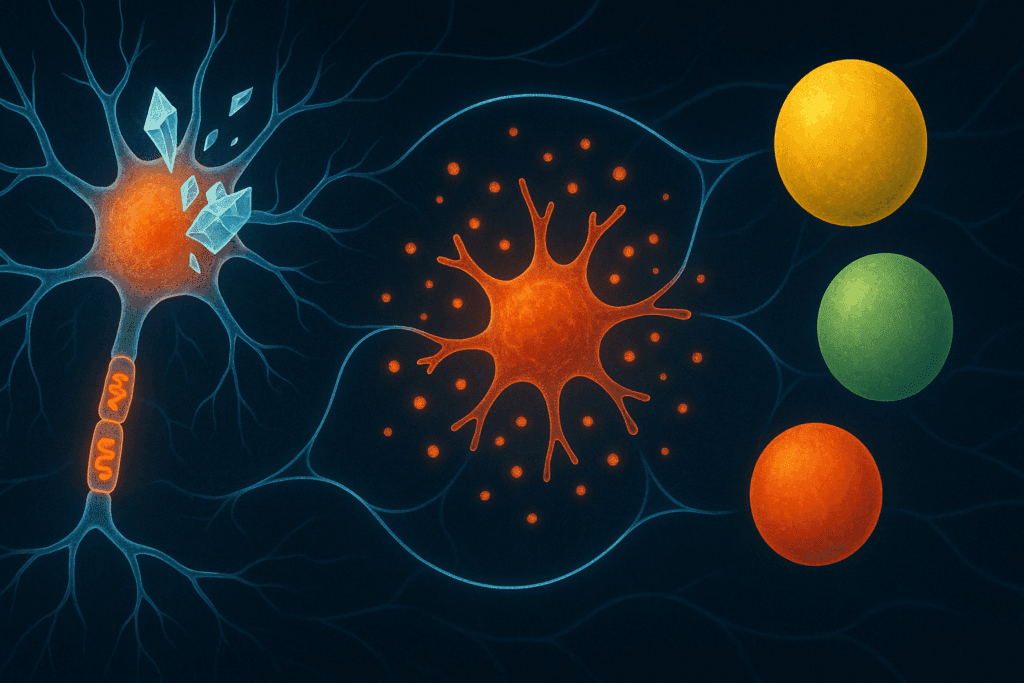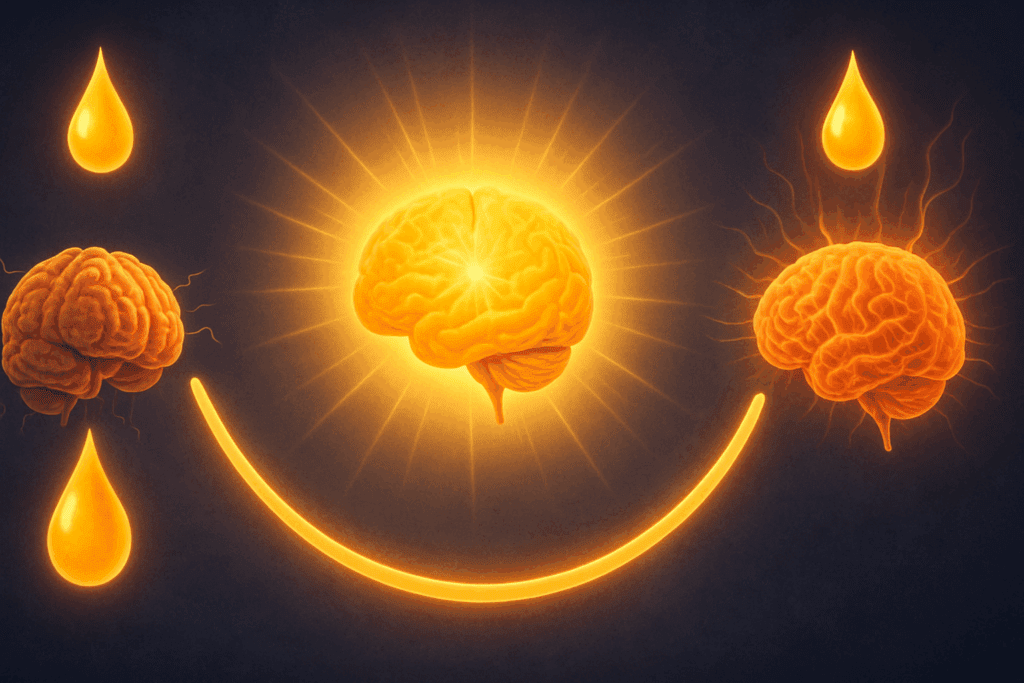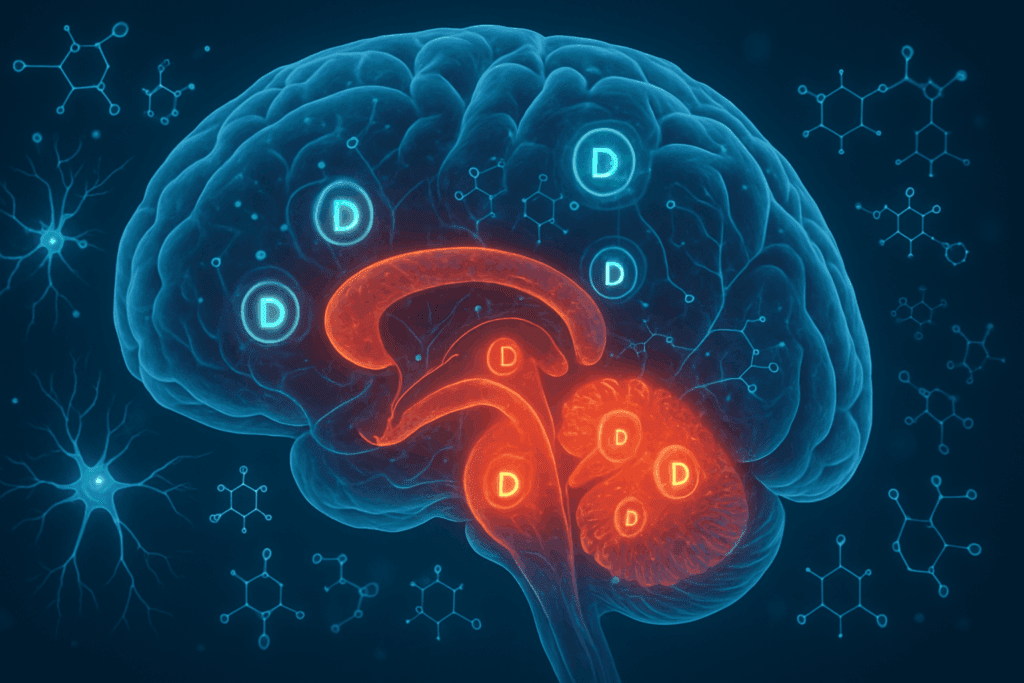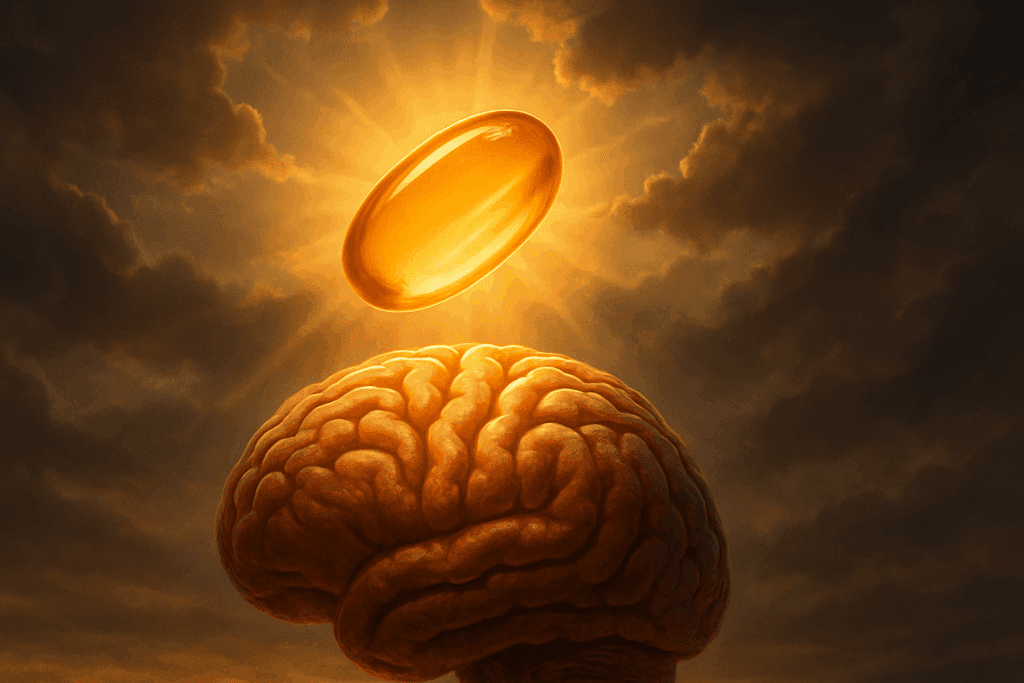Introduction: Understanding the Vitamin D Paradox in Brain Health
In the growing field of nutritional neuroscience, the relationship between vitamins and cognitive well-being has taken center stage. Vitamins, once considered simple micronutrients necessary for basic survival, are now recognized as dynamic contributors to brain function, memory retention, and emotional regulation. Yet, as the conversation evolves, new concerns emerge. Specifically, the question arises: can too much vitamin D cause dementia? This inquiry reflects a broader and critically important discussion about how the overconsumption of vitamins might inadvertently undermine the very cognitive resilience they are meant to bolster. For a health-savvy audience seeking to optimize both body and mind, understanding the nuanced interplay between vitamin D, cognitive health, and dementia risk is essential. Throughout this article, we will explore current scientific evidence, expert perspectives, and practical strategies to maintain optimal vitamin levels without venturing into harmful excesses.
You may also like: Where to Buy Bacopa Monnieri: How to Find Quality Supplements for Cognitive and Memory Support
The Essential Role of Vitamin D in Cognitive Function
Vitamin D is often celebrated for its role in maintaining strong bones and a healthy immune system. However, its influence extends far beyond skeletal health. Emerging research illustrates that vitamin D receptors are present throughout the brain, particularly in areas associated with memory and executive function, such as the hippocampus and prefrontal cortex. Vitamin D is thought to exert neuroprotective effects by regulating calcium balance in neural tissues, reducing inflammation, and promoting the production of neurotrophic factors that support neuronal growth and survival. In this context, ensuring adequate vitamin D levels becomes not just a matter of physical health but of mental vitality.

Still, the complexity of this relationship should not be underestimated. While adequate vitamin D is crucial for brain health, there is a delicate threshold between sufficiency and toxicity. Crossing this line raises pressing concerns about whether can too much vitamin D cause dementia is a valid fear or merely an overblown myth. To answer this, we must first delve into how vitamin D interacts with the brain at a molecular level.
How Vitamin D Influences Brain Structure and Function
Vitamin D modulates several key pathways involved in cognitive health. It enhances antioxidant defenses, reduces the production of pro-inflammatory cytokines, and mitigates oxidative stress—all factors implicated in the development of neurodegenerative diseases like dementia. Vitamin D also affects neurotransmitter synthesis, including serotonin and dopamine, which play critical roles in mood, motivation, and cognitive processing.
At the same time, studies show that vitamin D deficiency correlates strongly with cognitive decline, depression, and increased risk of Alzheimer’s disease. Conversely, supplementation in deficient individuals often leads to improvements in cognitive performance and mood stabilization. However, the narrative becomes more complicated when considering high-dose supplementation, especially in populations without documented deficiencies. Here, the emerging concern about whether can vitamins cause dementia when consumed in excess comes to the forefront.
Defining Vitamin D Toxicity: How Much Is Too Much?
Vitamin D toxicity, or hypervitaminosis D, is a rare but serious condition typically resulting from excessive supplementation rather than natural dietary intake or sun exposure. Toxic levels of vitamin D cause elevated blood calcium levels (hypercalcemia), leading to symptoms such as confusion, disorientation, muscle weakness, and kidney dysfunction. Over time, chronic hypercalcemia can damage blood vessels, the heart, and the brain.
In terms of cognitive health, sustained hypercalcemia can interfere with neuronal signaling, impair synaptic plasticity, and even promote neuroinflammation—pathways strongly associated with dementia progression. Thus, the idea that can too much vitamin D cause dementia is not without scientific merit, especially when hypervitaminosis D leads to persistent neurological dysfunction. Understanding the fine line between therapeutic supplementation and harmful excess is critical for maintaining cognitive health.

Evaluating the Evidence: Does Excessive Vitamin D Intake Increase Dementia Risk?
The current body of evidence on high vitamin D levels and dementia risk is nuanced and evolving. Several observational studies have noted U-shaped relationships between vitamin D levels and cognitive outcomes. In these models, both deficiency and excessively high levels correlate with cognitive impairment, suggesting that more is not always better.
For example, a 2022 study published in Neurology found that individuals with extremely high serum vitamin D concentrations had an increased risk of cognitive decline compared to those with moderate, optimal levels. Another analysis indicated that while low vitamin D status predicts faster memory deterioration, unusually high levels might paradoxically accelerate neurodegenerative processes. These findings strengthen the credibility of concerns that can vitamins cause dementia when dosages exceed physiological needs.
Nonetheless, more randomized controlled trials are needed to establish causality definitively. Until then, prudence dictates a cautious, individualized approach to supplementation, particularly in older adults who may be more vulnerable to the neurotoxic effects of hypercalcemia.
Potential Mechanisms Linking Vitamin D Excess to Dementia
Exploring the biological plausibility of how vitamin D overdose could contribute to dementia reveals several concerning mechanisms. First, as previously mentioned, chronic hypercalcemia can disrupt normal brain function, leading to neuronal death and cognitive deficits. Elevated calcium levels can impair mitochondrial function in neurons, limiting energy production and promoting apoptosis (programmed cell death).
Second, excessive vitamin D may dysregulate immune responses within the brain. Instead of reducing inflammation, abnormally high vitamin D concentrations might activate microglia—the brain’s resident immune cells—triggering neuroinflammatory cascades that damage neural networks crucial for memory and learning. This possibility reinforces the need to avoid indiscriminate supplementation without appropriate medical guidance.
Third, emerging hypotheses suggest that excess vitamin D may interfere with the balance of other fat-soluble vitamins, such as vitamin A and vitamin K, both of which are important for brain integrity. Disruptions in these delicate nutrient balances could have unintended consequences, potentially tipping the scales toward neurodegeneration.

Can Other Vitamins Contribute to Dementia Risk?
While vitamin D has garnered much attention, it is not the only nutrient under scrutiny. Questions about can vitamins cause dementia in a broader sense are also gaining traction. High doses of certain vitamins, particularly fat-soluble ones like A, E, and K, can accumulate to toxic levels and negatively impact brain health.
For instance, excessive vitamin A intake has been associated with increased intracranial pressure and cognitive disturbances. Similarly, very high doses of vitamin E, once thought protective against Alzheimer’s, have been linked to higher mortality rates in some clinical trials, raising concerns about its safety at supratherapeutic levels. Even high doses of vitamin B6, typically water-soluble, can cause neurological symptoms when taken excessively over long periods.
These examples underscore the principle that moderation is vital and that more is not always synonymous with better when it comes to supplementation. Thoughtful, evidence-based strategies must guide vitamin use, particularly in populations at risk for cognitive decline.
Individual Variability: Genetics, Lifestyle, and Vitamin Sensitivity
Another layer of complexity arises when considering how individual differences shape the response to vitamin D and other nutrients. Genetics can significantly influence vitamin D metabolism, with certain polymorphisms in the VDR (vitamin D receptor) gene affecting how individuals process and respond to supplementation.
Lifestyle factors, including diet, physical activity, sun exposure, and overall health status, further modulate vitamin D needs and risks. For example, someone with high baseline sun exposure may require little to no supplementation, while individuals living in northern latitudes or with darker skin tones might need additional support to maintain optimal levels. Thus, a personalized approach is paramount, as blanket recommendations can lead to unintended consequences, including potential cognitive harm.
Given these nuances, concerns about can too much vitamin D cause dementia must be framed within a broader, individualized health context, recognizing that one-size-fits-all guidelines are inherently limited.

Safe Strategies for Optimizing Vitamin D Without Overdoing It
In light of these findings, how can individuals ensure they are reaping the cognitive benefits of vitamin D without exposing themselves to undue risk? The first step is to prioritize regular blood testing, particularly measuring 25-hydroxyvitamin D levels to assess status accurately. Optimal ranges typically fall between 30-50 ng/mL, though precise targets may vary slightly depending on expert consensus and individual health factors.
Supplementation should be tailored to documented needs, not assumptions. Dosages exceeding 4,000 IU per day should only be undertaken under medical supervision, as chronic intake above this threshold increases the risk of toxicity. Moreover, combining vitamin D with cofactors like magnesium and vitamin K2 may help ensure balanced nutrient interactions and mitigate potential adverse effects.
Equally important is integrating natural sources of vitamin D—such as sunlight exposure and dietary options like fatty fish, fortified foods, and egg yolks—to maintain healthy levels more organically. This approach supports steady, physiologically attuned vitamin D synthesis without the risks associated with megadoses.
Practical Advice for Cognitive Health and Supplementation
When considering brain health more broadly, a holistic approach to nutrition is essential. Rather than fixating on single vitamins in isolation, it is wise to adopt diverse, nutrient-rich diets that provide a balanced spectrum of vitamins, minerals, and phytonutrients. The Mediterranean diet, for instance, has consistently been associated with lower dementia risk and emphasizes whole foods naturally rich in brain-supportive compounds.
Mindful supplementation—informed by testing, professional consultation, and individualized need—can complement this foundation but should never replace it. Avoiding the pitfalls of megadosing, especially without medical necessity, is a critical principle for safeguarding cognitive vitality over the long term.
Furthermore, maintaining other pillars of brain health—such as regular physical exercise, stress management, cognitive engagement, and adequate sleep—enhances resilience against neurodegeneration. These lifestyle factors work synergistically with optimal nutrition to preserve memory, processing speed, and emotional well-being across the lifespan.

Frequently Asked Questions: Vitamin D, Cognitive Health, and Dementia Risk
1. How could vitamin D toxicity influence mental clarity before full-blown dementia develops?
Vitamin D toxicity often begins subtly, with early cognitive symptoms that may be mistaken for ordinary forgetfulness or fatigue. Research suggests that long before dementia sets in, hypercalcemia caused by excess vitamin D can impair neurotransmission and synaptic efficiency, leading to brain fog, attention lapses, and delayed information processing. This raises legitimate concerns about whether can too much vitamin d cause dementia not only at late stages but potentially through early cognitive deterioration as well. Recognizing these preclinical signs allows for earlier intervention to adjust vitamin D levels safely. Monitoring mental sharpness alongside serum calcium measurements offers a practical strategy for preventing cognitive complications associated with high-dose supplementation.
2. Why might older adults be more vulnerable if too much vitamin D is consumed?
Age-related changes in metabolism, kidney function, and vitamin D receptor sensitivity can amplify the risks linked to over-supplementation. In older adults, even moderately elevated doses may lead to disproportionate rises in serum calcium, enhancing the plausibility that can too much vitamin d cause dementia is a heightened concern in this demographic. Moreover, cognitive resilience naturally declines with age, making the brain less capable of compensating for metabolic disturbances. Elderly individuals often manage multiple medications, some of which may further alter calcium regulation or interact with vitamin D, compounding risks. Personalized supplementation plans and routine lab monitoring are particularly crucial in safeguarding cognitive function in aging populations.
3. Can the form of vitamin D supplement affect the risk of cognitive issues?
Not all vitamin D supplements are created equal, and the form matters significantly. Vitamin D3 (cholecalciferol) is generally more potent and bioavailable than D2 (ergocalciferol), meaning that inappropriate dosing of D3 can more rapidly escalate serum levels into a harmful range. This reality deepens the complexity behind the question of can vitamins cause dementia, especially when considering the cumulative effects of high-potency supplements. Additionally, oil-based vitamin D preparations tend to absorb more efficiently than dry tablets, potentially necessitating different dosing thresholds. Selecting the appropriate form and delivery method with professional guidance reduces the risk of cognitive impairment related to vitamin D overuse.
4. How do co-nutrient imbalances contribute to cognitive risks from excess vitamin D?
An often-overlooked factor is that excessive vitamin D can disrupt the delicate balance of other critical nutrients like magnesium, vitamin K2, and vitamin A. These nutrients interact synergistically to regulate calcium distribution, protect arteries, and support neural functions. If magnesium is depleted, for instance, vitamin D’s effectiveness is impaired while its toxicity potential increases, possibly heightening the risk that can too much vitamin d cause dementia becomes a clinical reality. Similarly, without sufficient K2, calcium may deposit in the brain’s vasculature rather than bones, leading to vascular dementia over time. Addressing the full nutrient ecosystem is vital when evaluating cognitive risks from vitamin supplementation.
5. Are there early warning signs that vitamin-induced cognitive issues might be developing?
Subtle shifts in mood, motivation, and memory often precede more recognizable signs of dementia. Individuals experiencing excessive vitamin D exposure might notice increased irritability, depressive symptoms, insomnia, or difficulty recalling recent conversations\u2014symptoms that warrant deeper evaluation. Asking whether can vitamins cause dementia should involve monitoring for these nuanced changes, not just dramatic memory loss. Engaging in regular cognitive screening and discussing any changes with healthcare providers can catch potential issues before they evolve into lasting neurological damage. Early detection is key to reversing course through dietary adjustments and supplementation management.
6. How might high vitamin D intake interact with existing neurological conditions?
In individuals already managing neurological conditions such as multiple sclerosis (MS) or Parkinson\u2019s disease, excessive vitamin D supplementation presents complex risks. While moderate vitamin D levels are often supportive of neurological health, high doses can destabilize calcium homeostasis, exacerbating symptoms like muscle stiffness, spasticity, or tremors. Consequently, concerns about can too much vitamin d cause dementia take on even greater urgency for these populations. Patients with preexisting brain-related diagnoses should undergo individualized dosing plans that account for their unique vulnerability. Working closely with neurologists and nutritionists ensures that vitamin D acts as a therapeutic ally rather than a hidden adversary.
7. Can long-term use of multivitamins contribute to cognitive decline if not managed properly?
Long-term multivitamin use, especially formulations containing high doses of fat-soluble vitamins, could inadvertently increase cognitive risks if not carefully calibrated. Many over-the-counter products exceed recommended daily intakes, raising the potential that can vitamins cause dementia becomes more than a theoretical risk for habitual users. Furthermore, combinations of nutrients can interact unpredictably when taken in mega-doses, amplifying neurotoxic effects. Rotating supplement brands or using targeted formulations based on verified deficiencies\u2014rather than broad-spectrum “insurance policies”\u2014offers a more strategic, lower-risk approach to cognitive preservation. Smart supplementation hinges on periodic reassessment rather than set-and-forget regimens.
8. What are emerging research trends exploring the link between vitamin D and brain aging?
Cutting-edge studies are delving into how vitamin D interacts with amyloid plaques, tau protein tangles, and vascular health\u2014all central players in dementia pathogenesis. Some researchers hypothesize that while physiological levels of vitamin D may inhibit these pathological processes, excessive levels might paradoxically accelerate them. This emerging evidence helps contextualize why questions like can too much vitamin d cause dementia are gaining traction in scientific circles. Longitudinal cohort studies, brain imaging trials, and genetic analyses are underway to unravel the threshold at which benefits flip into risks. These insights will likely reshape future guidelines for safe vitamin D use in brain health management.
9. Are there psychological factors influencing how people perceive vitamin supplementation and cognitive risk?
Behavioral psychology offers important clues about why individuals might over-supplement despite known risks. The “more is better” fallacy, driven by health marketing and anecdotal success stories, often leads people to assume that megadosing is harmless. This psychological bias complicates public understanding of nuanced questions like can vitamins cause dementia when taken irresponsibly. Fear of aging and cognitive decline can further fuel supplement overuse, ironically increasing the very risks individuals seek to avoid. Public health messaging needs to shift toward promoting balance, moderation, and individualized care rather than blanket endorsements of high-dose vitamin therapy.
10. What future innovations might help personalize vitamin D supplementation to prevent cognitive risks?
Advances in precision medicine, including nutrigenomics and metabolomics, are paving the way for highly individualized vitamin supplementation protocols. These technologies could soon predict how specific people metabolize and respond to nutrients, offering customized dosing strategies that eliminate the guesswork. When it comes to preventing scenarios where can too much vitamin d cause dementia becomes a personal reality, personalized supplementation will likely become the gold standard. Wearable biosensors and home-based nutrient testing kits may also emerge, providing real-time data to fine-tune supplementation dynamically. By embracing innovation, we can move closer to optimizing cognitive longevity without sacrificing safety.

Conclusion: Navigating the Complex Relationship Between Vitamins and Brain Health
As scientific understanding deepens, it becomes increasingly clear that while vitamins play indispensable roles in supporting brain function, excesses can carry real risks. The question of can too much vitamin D cause dementia is not merely hypothetical but grounded in emerging evidence highlighting the dangers of over-supplementation. Similarly, broader concerns about whether can vitamins cause dementia reflect a growing appreciation for the delicate balance required in nutritional interventions.
Practical, science-driven strategies—such as individualized testing, cautious supplementation, and holistic lifestyle practices—offer a roadmap for maximizing cognitive health while minimizing unintended harms. Ultimately, respecting the body’s natural regulatory mechanisms, rather than overriding them with excessive supplementation, represents the wisest path forward for preserving brain vitality in the decades to come.
By fostering an informed, balanced approach to vitamin use, we empower ourselves to navigate the complex landscape of cognitive health with wisdom, discernment, and resilience.
Was this article helpful? Don’t let it stop with you. Share it right now with someone who needs to see it—whether it’s a friend, a colleague, or your whole network. And if staying ahead on this topic matters to you, subscribe to this publication for the most up-to-date information. You’ll get the latest insights delivered straight to you—no searching, no missing out.
Further Reading:
Vitamin D, cognitive dysfunction and dementia in older adults
Vitamin D and the risk of dementia and Alzheimer disease
Consumption of Vitamins D and K May Keep Memory Diseases Away
.Important Note: The information contained in this article is for general informational purposes only, and should not be construed as health or medical advice, nor is it intended to diagnose, prevent, treat, or cure any disease or health condition. Before embarking on any diet, fitness regimen, or program of nutritional supplementation, it is advisable to consult your healthcare professional in order to determine its safety and probable efficacy in terms of your individual state of health.
Regarding Nutritional Supplements Or Other Non-Prescription Health Products: If any nutritional supplements or other non-prescription health products are mentioned in the foregoing article, any claims or statements made about them have not been evaluated by the U.S. Food and Drug Administration, and such nutritional supplements or other health products are not intended to diagnose, treat, cure, or prevent any disease.


